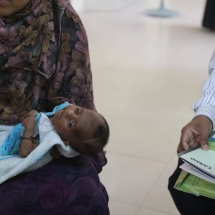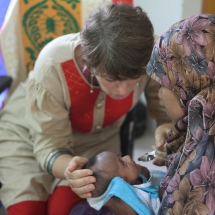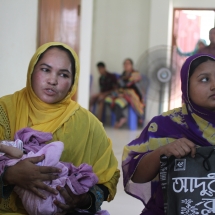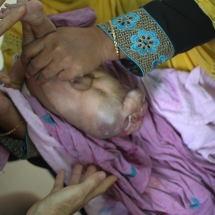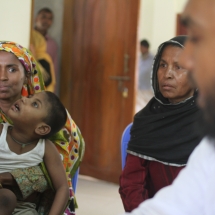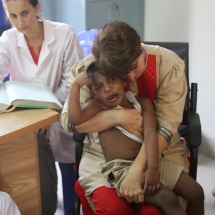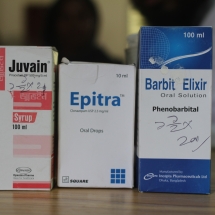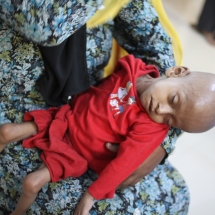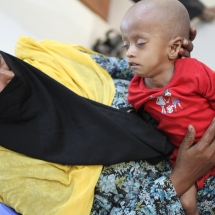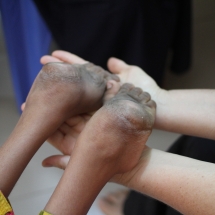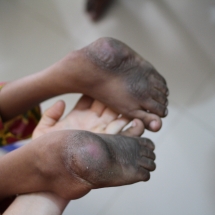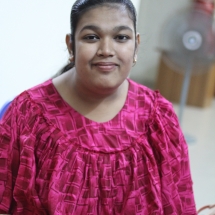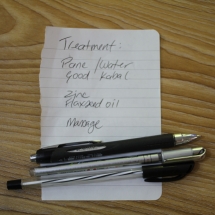Tuesday 22/3/16 – Day 7
We have treated so many children since we’ve been here with a vast range of variations of the same conditions. We thought we’d seen everything, until today. One severely brain-damaged girl, Ahida, 8 months old, was so utterly dehydrated due to lack of fluids. She was the size of a one month old baby. Her mother was no longer breast feeding and she could not suck a bottle. We gave her water from a spoon to see if she could retain some of it. She did. And much of it dribbled out too. Within a few minutes of doing this, her eyes started to become more alive and her skin started to feel like a newly-formed leaf with water coursing through her. She had such a long way to go though. We gave her mother rice protein powder and probiotics to mix with water and spoon-feed it to the tiny girl all throughout the day. We wish the best for her.
Straight after this little girl was another severely brain-damaged boy, Aljunahid, 3 months old. He too was dehydrated. I asked the mother through gesturing if he was still breast feeding. She nodded, yes. I asked the Dr to explain to the mother that the baby was hungry and needed feeding as he was opening and closing his little tiny mouth, a sign of extreme dehydration. The mother opened the little boy’s blanket, and we all recoiled in horror. He had this massive anal haemorrhoid that was bigger than the rest of his body. He couldn’t keep any food in his stomach as his digestive system had already started to shut down. There was absolutely nothing we could do for him. His mother was still breast feeding him and we urged her to keep doing this as long as possible. The hospital wanted to do an experimental operation on him. I was incredulous. I told the Dr that he was a human, not a lab rat to be experimented on. Any operation in his present condition would kill him, although, at least he wouldn’t have to suffer anymore. But we couldn’t suggest that. Our love and overwhelming compassion for him was uppermost. We wished his last days to be peaceful ones.
The medicines that are given to children here is criminal. We had a child given very strong medicines to control his seizures. The medicines create other problems in these children’s bodies and they have no way to express the anguish and suffering except through tears and uncontrollable seizures. As we hold these precious little bodies in our arms, they convulse and contort every few minutes. There is no termination of this relentless torment. This little 5 year old boy, Abdul, was constantly seizing, his tears of anguish so real as the suffering ravages his body. This will be his daily life for all the days he is alive.
Many concerned parents and onlookers would like to join with us to help the children of Bangladesh and see changes take place to the health system here. There is little available information for parents with disabled children, and the doctors and hospitals are keen to give medications, perform surgery, or order expensive tests for conditions that are obvious and that they would see on a daily basis, such as Epilepsy. It’s so common here, and so obvious that even our our Bangladeshi team could pick up the signs as soon as they saw the children. Yet little is done to prevent the causes, only to manage (if that’s what it’s called) the symptoms. Parents are not given correct or even sufficient information to do this. We’ll continue our talks with our Bangladeshi friends and government officials here, as well in Australia, to have help made more available.
The days are becoming one. Everyday is so much like the day before. It’s only when we look at the photos we’ve taken, that we realise how many crumpled bodies we’ve treated.
Yesterday, Dr Hakim left for his home in Narayongonj. So today, Yasin and his sister, Eb’Ha are translating for us. Yasin is being trained to treat the children. Most of what he is learning is massage so far. Both of them are learning to read the symptoms of the children that are coming in, explain the problem to the parents and give medicine and advice on how to improve or manage their children’s health. They are both very keen to learn. Our speaking of the Bangla language is improving every day. We can usually convey what we need to say partly in Bangla and partly in English. Yasin and Eb’Ha translate the rest. It works ok.
Micheal is in bed today with Bangla belly. He is quite ill. So he will rest all day and conserve his energy. Colleen and Sakib take the photos of the children.
Now that Dr Hakim has left, Yasin has said he will continue to look after the children and provide their medicine free-of-charge. I will raise more funds in Australia to support Yasin, Eb’Ha and Sakib, to carry on this work. I think we have started a movement here of caring for the children in a way that has never been done in Bangladesh before. It feels really good.
The patients have been waiting hours to see us. Children with their parents, and sometimes the extended family arrive in the early morning hours to guarantee a spot to receive treatment. It’s rather daunting to be so in demand. When we arrive, we scurry inside, trying not to meet the expectant gaze of the hopeful parents. Yasin and Sakib hold the crowds back till we get inside and ready ourselves for the day. Then they come in en masse, all vying for a position at the front, not realising that we have already allocated them a number.
One of our first patients of the day is a 4 year old boy the size of a 2 month old baby. He is skin and bones. He has not eaten for weeks. He has not had any fluids for days. He is nearly dead. We all feel so frustrated and miserable about the illnesses that these children have, which create so many problems inside their bodies, that then prevents them from taking in food or water. I tell the mother her boy is dying. She looks at me helplessly, asking me to fix him and make him well. I explain he needs water, she doesn’t understand. Yasin and Eb’Ha do their best to explain to no avail. We have no medicine to give her. Her son is too weak. We show her how to spoon feed him water, but still she refuses to cooperate. She wants him better, now. I assume Yasin tells her to go home. It is not easy on him to do this. He has so much compassion for her and her situation. He and Eb’Ha look sad. They are new to having to explain difficult messages to parents who have no idea about why their children are sick and why we cannot make them whole again. They are learning fast. After a few days, Colleen and I became hardened to this heartbreaking work. Now, we deliver the messages with ease, grace and dignity. (Image no. 2104, 2105)
A 15 year old girl, who walked in gracefully and in obvious good health, amazed us with the deformity in her feet. It was like her feet had been put on backwards. Yet throughout her life she had managed to stand and walk on the tops of her feet. We suggested daily massage of her feet and getting comfortable padded shoes for her feet, so as not to damage the fine skin on the top of the feet. (The skin on the bottom of our feet is tougher to withstand the roughness of walking). The bones in her feet were fused and couldn’t be repositioned without surgery.
A mother bought her 20 year old brain-damaged daughter in for treatment. She was mentally slow, otherwise functioning healthily and could be taught many skills, with practice. Her parents wanted to marry her off and not have to look after her. It took a lot of explaining to convince the mother that a husband wouldn’t look after her, as it is the role of a wife to look after the husband and children in a Muslim household. We suggested our usual treatment protocol of pane (water), balo caba (good food), flaxseed oil, zinc, and massage with magnesium oil. We wished them well.
We said we would be having a day off tomorrow. We were exhausted physically, emotionally, mentally and spiritually.

